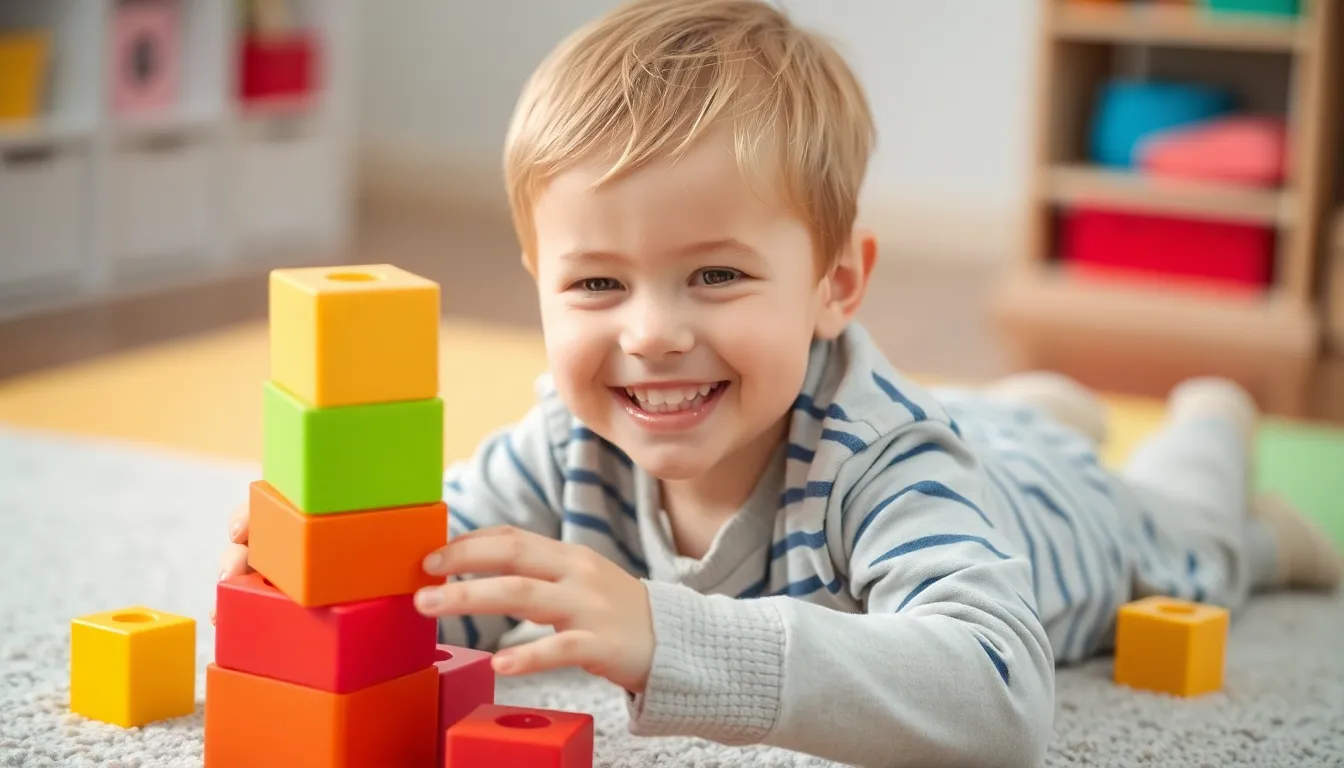Table of Contents
ToggleWatching a toddler navigate their world is like witnessing a tiny scientist in action. Every day brings a new experiment, whether it’s figuring out how to stack blocks or testing the limits of their vocal cords. This stage of cognitive development is crucial, as little minds are like sponges, soaking up knowledge and skills at an astonishing rate.
Overview Of Toddler Cognitive Development
Toddler cognitive development encompasses significant growth in how young children think, explore, and learn. During this stage, they engage in experiments that enhance their understanding of the world around them. Daily activities like stacking blocks or creating sounds serve as critical learning opportunities.
Children develop problem-solving skills through trial and error. By trying different ways to complete a task, such as fitting shapes into corresponding holes, they refine their reasoning abilities. Recognizing relationships between objects and concepts becomes more pronounced as they experiment.
Memory also plays a pivotal role in cognitive growth. They begin to recall past experiences and learn to anticipate future events. This capacity for memory allows them to connect previously learned concepts with new information, supporting a deeper understanding of their environment.
Language development is another crucial aspect. Vocabulary increases rapidly, often incorporating new words into daily conversations. This expansion allows toddlers to express needs and emotions more effectively, facilitating social interactions and enhancing cognitive understanding.
Play becomes a vital part of cognitive development. Engaging in both solitary and interactive play contributes significantly to their learning process. Through imaginative scenarios, children can practice problem-solving, communication skills, and emotional regulation.
Ultimately, these cognitive advancements lay the foundation for future learning. Strong cognitive skills in early childhood contribute to academic success later. As toddlers explore, experiment, and expand their knowledge, they prepare for more complex cognitive tasks ahead.
Key Stages Of Development

Toddler cognitive development consists of distinct stages that shape their learning journey. Understanding these stages helps caregivers foster growth effectively.
Sensorimotor Stage
The sensorimotor stage occurs from birth to approximately 2 years old. During this period, toddlers explore the world through their senses and physical actions. They learn that objects exist even when out of sight, a concept known as object permanence. Additionally, toddlers begin engaging in simple problem-solving by manipulating objects, like stacking blocks or pressing buttons. Experiments with cause and effect become apparent as they observe reactions to their actions. Vocabulary starts expanding as they associate words with objects and activities. This stage sets a solid foundation for future cognitive skills.
Preoperational Stage
The preoperational stage spans from ages 2 to 7 years. In this phase, language development accelerates markedly, allowing toddlers to express thoughts more clearly. They engage in imaginative play, creating scenarios and roles that help understand the world around them. Symbolic thinking emerges as they begin to use symbols to represent objects and ideas. However, logical reasoning remains limited, leading to egocentric views where they struggle to see perspectives other than their own. This stage is crucial for developing social skills, creativity, and expanding their understanding of the environment.
Factors Influencing Cognitive Development
Cognitive development in toddlers is influenced by various factors, including genetic and environmental elements.
Genetic Factors
Genetic factors play a significant role in shaping cognitive abilities. Research indicates that inherited traits can determine aspects of intelligence and learning styles. Children may exhibit varying capacities for memory, problem-solving, and language acquisition based on their genetic makeup. Specific genes linked to cognitive functions can affect brain development and processing speed. This biological foundation influences how toddlers engage with their environment and absorb new information.
Environmental Factors
Environmental factors significantly impact cognitive development in toddlers. Home environment, social interactions, and educational opportunities contribute to learning experiences. Access to stimulating materials, such as books and toys, enriches cognitive growth. Quality of care and attachment between a caregiver and child affects emotional security, which in turn influences learning. Additionally, social interactions with peers promote communication skills and problem-solving. Engaging in diverse activities fosters exploration, facilitating cognitive connections and essential skills for future learning.
Activities To Promote Cognitive Growth
Encouraging cognitive growth requires engaging activities that stimulate young minds. Several approaches can foster this development.
Play-Based Learning
Incorporating play into daily routines offers toddlers valuable experiences. Hands-on activities like building blocks promote problem-solving and creativity. Engaging in pretend play enhances imagination and social skills while allowing toddlers to narrate stories. Toys like shape sorters and puzzles challenge critical thinking and spatial awareness, fostering cognitive connections. Frequent opportunities for unstructured play encourage exploration and experimentation, leading to enhanced learning.
Interactive Reading
Reading aloud promotes language development and comprehension. Choosing age-appropriate books with vivid illustrations captures toddlers’ attention. Questions about the story encourage dialogue, enhancing their critical thinking skills. Pointing to pictures and naming objects aids vocabulary expansion. Repetition of favorite books reinforces memory and prediction skills, allowing toddlers to anticipate storylines. Interactive elements, such as pop-up features, deepen engagement and enjoyment, making reading a fun bonding activity.
Common Challenges In Cognitive Development
Cognitive development in toddlers faces several challenges that caregivers need to recognize. One common issue is difficulty with memory. Some toddlers struggle to recall past experiences, which can hinder their ability to connect new information with what they already know. Learning opportunities may be lost if they can’t remember important concepts.
Language acquisition also presents challenges. Many toddlers experience frustrations as they attempt to express their needs or emotions. Limited vocabulary can lead to misunderstandings in social interactions. Effective communication is critical for emotional regulation and social skills, and when toddlers can’t articulate thoughts, it impacts their cognitive growth.
Attention span poses another challenge. Toddlers often transition between activities quickly, making sustained focus difficult. This limitation can affect their ability to engage in in-depth problem-solving or exploration. Simple distractions may derail their learning process.
Social interactions play a significant role in cognitive development as well. Some toddlers may struggle to engage with peers, limiting their opportunities for cooperative play and shared learning experiences. When they miss out on these interactions, crucial skills like empathy, cooperation, and communication can lag behind.
Environmental factors significantly impact cognitive challenges too. Inadequate stimulating environments lead to missed opportunities for exploration and learning. Access to enriching activities, books, and supportive caregivers fosters emotional security, which is essential for cognitive growth.
Finally, the influence of frustration about learning outcomes can also hinder a toddler’s willingness to try new things. When faced with challenges, some may withdraw instead of seeking solutions. Nurturing resilience through encouragement can help toddlers overcome these obstacles and continue developing vital cognitive skills.
Toddler cognitive development is a fascinating journey marked by exploration and discovery. As toddlers engage with their environment they build essential skills that will serve them throughout their lives. Caregivers play a crucial role in this process by providing supportive and stimulating environments that encourage curiosity and learning.
By understanding the various stages of cognitive growth and the factors influencing development caregivers can better nurture their child’s potential. Incorporating play-based learning activities and fostering social interactions not only enhances cognitive skills but also lays a strong foundation for future academic success. Embracing this critical developmental phase equips toddlers with the tools they need to navigate their world confidently.







